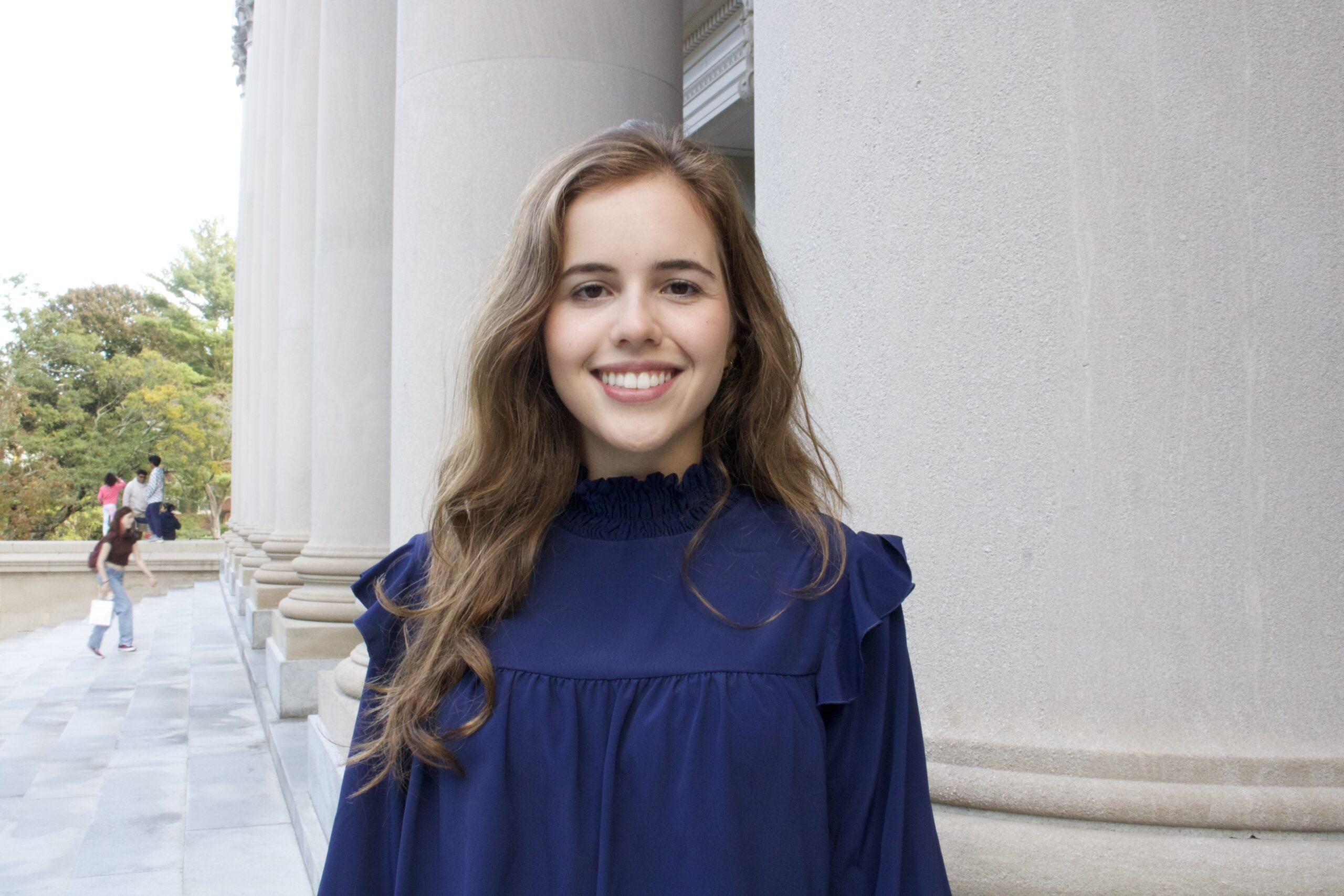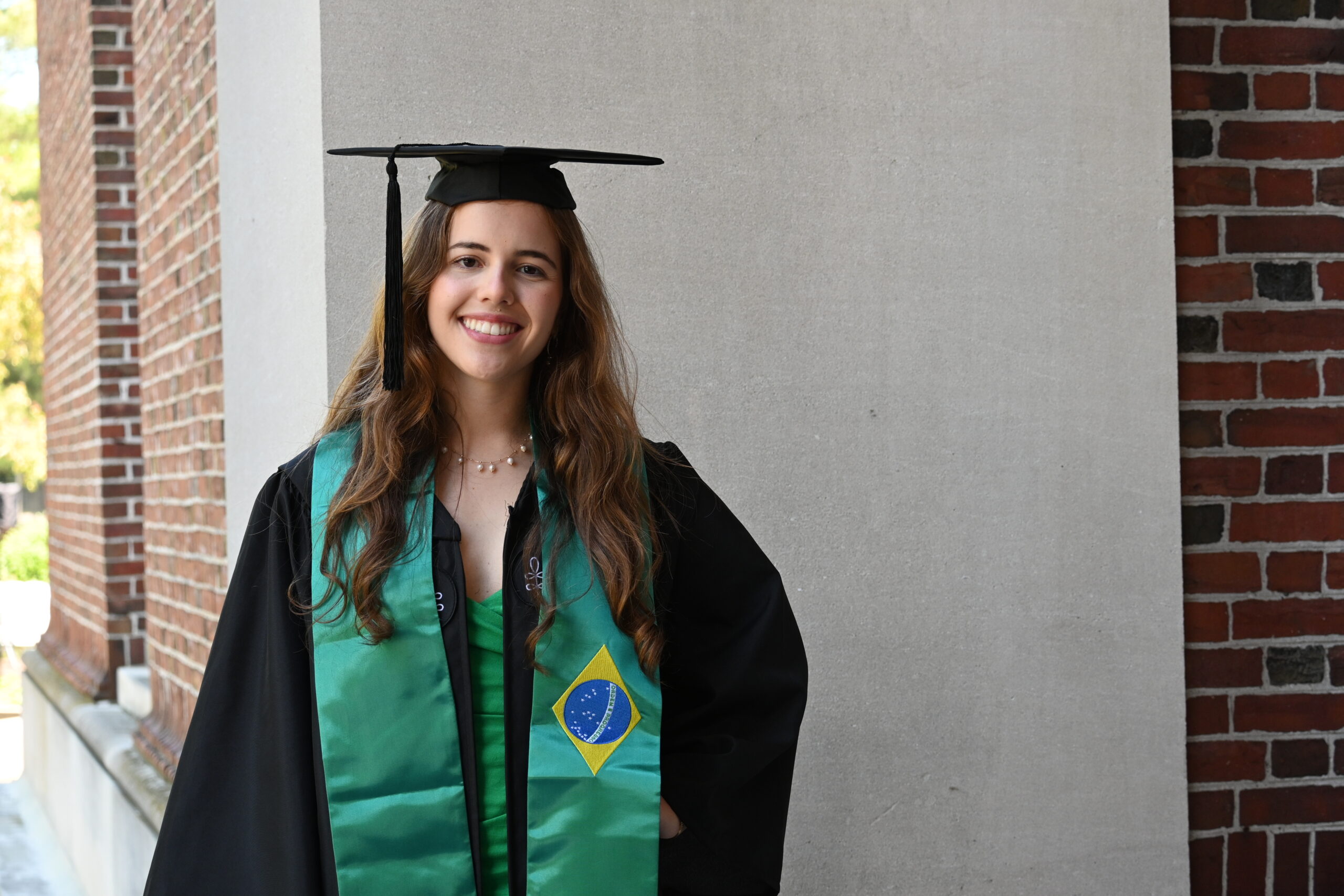
Sarah Borges' research aims to investigate the effectiveness of mental health services, particularly in poorer areas of the world.
I want to understand how we can improve mental health care for everyone, especially for those who need it most.
Sarah Borges
Poor mental health is one of the leading causes of disability worldwide and is linked to poor educational and professional outcomes and serious psychological distress. Over 75% of mental illnesses begins before age 25, making youth a key population for both research and intervention.
Sarah Borges’ work focuses on the intersection between psychological science and public health, particularly on understanding how young people access mental health services and whether those services are effective. Having begun her university career in medicine in Brazil, she has since gravitated towards Psychology at Harvard, where she has been exploring the impact of social stigma on take-up of mental health services.
In her undergraduate thesis, Sarah [2025] found that among Brazilian youth in two urban centres, higher levels of stigma were linked to lower intention to seek mental health services, although not to actual service use in the past year. She concludes that it is important for mental health researchers to question the parameters of their research. “It’s not enough to be willing to seek help,” she says. “We need to examine what people actually do.”
For her PhD at the University of Cambridge, Sarah will work under the supervision of Dr Sharon Neufeld to examine whether mental health services for young people in Brazil are effective. “There is an urgent need for rigorous data on this question, especially in low- and middle-income countries,” she says, adding that, despite comprising 90% of the world’s youth population, these countries represent only about 4% of psychological study samples.
Sarah plans to leverage her thesis dataset and qualitative interviews with health professionals, caregivers and young people to assess the real-world effectiveness of public and private mental health services in Brazil. Her research will go beyond symptoms to include outcomes like life satisfaction and educational attainment. She aims to answer not just whether services work, but who benefits the most from them – and why. Factors like stigma, socioeconomic status and service type will form a big focus. “I want to understand how we can improve mental health care for everyone, especially for those who need it most,” she says.
Childhood
Sarah was born and raised in Goiânia in central Brazil. Her primary and middle school education was mainly spent in one private school, paid for with financial assistance from the owners. It emphasised an all-round education, with one day a week dedicated to activities such as art, theatre, swimming and chess. “It fostered a real joy for learning that has stayed with me ever since,” she says.
Her mother, a trained social worker who worked as a primary school teacher and later ran shoe and furniture shops, passed on her passion for social justice to Sarah. Her father, a civil engineer who worked in the cosmetics industry until retirement, also supported her academic pursuits. Sarah has two sisters – one who is eight years older and a twin currently studying medicine in Brazil. Although the twins shared many academic interests, their paths diverged when Sarah chose to leave medical school to study abroad, becoming the first in her immediate family to pursue higher education outside Brazil.
In high school, supported by a merit-based scholarship, Sarah excelled in all disciplines, and especially enjoyed the sciences and Philosophy. She won medals in more than 10 national academic Olympiads across Biology, Chemistry, Mathematics and Astronomy, and was pre-selected for the International Olympiad on Astronomy and Astrophysics. However, when it came time to choose a career, she was uncertain. She had a broad range of interests and a desire to engage in research that made a difference.
A school programme that introduced her to the science of learning sparked her fascination with the human brain. Noticing her frustration with the rigid Brazilian university system, her older sister suggested she consider studying abroad. Sarah discovered the liberal arts college model through YouTube videos and was drawn to its flexibility and international environment. Initially discouraged by the high costs of overseas admissions consultants and the complexity of the application process to US universities, she eventually found BRASA, a non-profit of Brazilian students abroad, which offered free mentoring.
“It changed my life,” she says. With their support, she applied to universities in the US, while also preparing for Brazil’s demanding national entrance exam. She developed her English by watching videos and recording herself and scored the highest mark in Advanced Mathematics and Physics in the SAT Subject Tests. After receiving several offers of admission, she opted for Harvard based on numerous factors, including access to research opportunities and a supportive Brazilian community.
Undergraduate studies
 Since Harvard’s admission decision arrived after the academic year had begun in Brazil, Sarah had already enrolled at the University of São Paulo to study Medicine. But she soon realised that her interests lay less in the biochemical aspects of the brain and more in its social and psychological dimensions. She received the news that she had a place at Harvard two months after starting university and a day before her birthday. Because of the pandemic, she took a gap year and started at Harvard in 2021.
Since Harvard’s admission decision arrived after the academic year had begun in Brazil, Sarah had already enrolled at the University of São Paulo to study Medicine. But she soon realised that her interests lay less in the biochemical aspects of the brain and more in its social and psychological dimensions. She received the news that she had a place at Harvard two months after starting university and a day before her birthday. Because of the pandemic, she took a gap year and started at Harvard in 2021.
During her gap year, Sarah designed an education programme to support public school students whose learning had been disrupted by the pandemic. She created an exam preparation course based on the most frequently tested topics, enlisted former teachers as volunteers and partnered with an NGO who she pitched the idea to just a month before she had to deliver it. The programme started in her home state and expanded across the country, attracting over 500 sign-ups. “It gave me a real sense of meaning during a very challenging time,” she says.
She also worked on several other initiatives. With 10 girls from across Brazil, she co-built “STEM para as Minas”, an online platform promoting gender equity in STEM in Brazil for which she produced a podcast featuring leading Brazilian women scientists and led a team of volunteer writers. With a friend from Paraguay, she also started “Círculo”, a virtual programme that connected over 100 students from across Latin America to learn topics of interest and develop a community-based project. She also served as a mentor for Brazilian students applying to US universities.
At Harvard, Sarah explored a wide range of subjects, from Philosophy to Computer Science, before finding her academic home in Psychology. Classes on social psychology and stigma and discrimination and health sealed the connection between her longstanding social concerns and her love of science. “Psychology allows me to better understand the fascinating mechanisms of the human mind, as well as how they influence and are influenced by society at large,” she says. Once she discovered Psychology, she didn’t look back.
Research
Sarah has been involved in research since her first year at Harvard. One of her early projects was with Professors Mahzarin Banaji and Tessa Charlesworth, studying how gender stereotypes in STEM relate to gender disparities in academic performance. She helped design the study and collected and compiled extensive data for over 50 countries. The experience introduced her to the power of large datasets, advanced statistics and evidence-based research.
In her first summer break, she came to Lancaster University in the UK to study the psychology of climate change, investigating how behavioural interventions can motivate collective action. This was also where she taught herself R, a statistical programming language she has since used extensively. The following summer, she worked in Professor Fiery Cushman’s lab, where she co-designed a game to explore how perceived control affects decision-making. The hypothesis was that a lower sense of control leads to more extreme or catastrophic thinking which is a potential mechanism underlying depression and anxiety. This introduced her to experimental psychology and computational psychiatry and shifted her focus toward mental health. “I realised I wanted to use the rigorous methods I learned in social psychology research to study outcomes that deeply impact people’s wellbeing,” she says.
Her final year deepened that commitment. During the summer, Sarah contributed to a research project that used generative AI to support teacher training in social and emotional learning. She also joined Professor Matthew Nock’s lab, working on projects examining suicide stigma and trauma assessment tools across cultures. These experiences further solidified her interest in the intersection of mental and public health.
For her senior thesis, under the supervision of Professor Mark Hatzenbuehler, Sarah analysed how mental illness stigma affects help-seeking and service use among young people in Brazil. Her work revealed nuanced patterns: for instance, young people who believe mental illness is dangerous were more likely to say they would seek help, but less likely to follow through. “There’s a gap between beliefs and behaviour,” says Sarah. Her findings underscore the complexity of stigma and suggest new ways to improve mental health outreach.
In her final year at Harvard, Sarah knew she wanted to continue doing research that could have real-world impact. She was drawn to the UK’s public health system and to researchers like Dr Sharon Neufeld, whose work uses rigorous analytical methods to assess real-world interventions. Dr Neufeld’s support for Sarah’s proposed research in Brazil and the Gates Cambridge Scholarship sealed her decision to choose Cambridge for her PhD.
Sarah is deeply grateful for the opportunities she has had. “While I have always worked hard and remained curious, I am acutely aware that much of what I have achieved is thanks to circumstances beyond my control,” she says. “A love of learning that was nurtured from a young age, a family that supported me every step of the way and a broader social context that made these opportunities possible. This awareness gives me a profound sense of responsibility: to use the talents and chances I was lucky to receive to help make this world a better place.”












